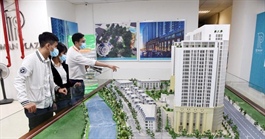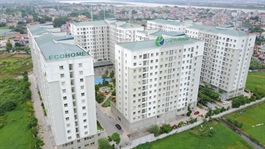Building cities fit for human needs
Building cities fit for human needs
Building liveable and smart cities can only come from the backing of citizens as well as government master plans, a major conference in Singapore heard last week.
The eighth edition of the biennial World Cities Summit returned to a fully in-person conference format at the Sands Expo and Convention Centre in Marina Bay Sands after a largely virtual summit last time out. At the event, numerous examples were outlined of global cities responding to urban challenges in terms of how to be more resilient, sustainable, and cohesive.
The theme of this year’s summit, “Liveable and Sustainable Cities: Emerging Stronger”, was crafted to reflect the urgent and important imperative that economic growth can no longer be pursued at the expense of climate change and environmental degradation.
Maimunah Mohd Sharif, executive director of the UN Human Settlements Programme said at the summit that the world has had enough policies, strategies, and innovations. “What we are lacking are actions and we need to act now. This is the time to support multilateralism,” Sharif said.
“The pandemic woke us up to really look at the design and focus on housing, climate change, and localisation of suburbs. Governments themselves cannot act alone, and the partnership between the public and private sector is essential to foster resilience among cities.”
According to UN statistics, the percentage of the world’s population living in urban areas has risen from 39 per cent in 1980 to 55 per cent today. It projects that urbanisation will increase to 68 per cent globally by 2050, which translates to an additional 2.5 billion people in urban areas. Currently, most countries have their own nature-based solutions in support of the climate-resilient informal settlement through their public space projects.
At the same time, they utilise local resources to accelerate the role of their resilient settlement programmes. “Demography in ageing is increasingly becoming a key issue through the level of government needs to plan for great cities and towns, including city profiling and planning for resilience and adaptation. It is important to localise and implement our sustainable development goals for the improvement of people’s lives,” Sharif stressed.
Hugh Lim, executive director for the Centre for Liveable Cities in Singapore added, “Cities are an ecosystem, so when systemic disruptions occur, the effect is felt at every level – as we have all personally experienced in the past two years. Conversely, it is also this form of integration that drives the enormous potential for cities to become better prepared for dealing with disruptions and collaborating to develop new solutions to common problems.”
It is hoped that last week’s summit in the city-state of Singapore becomes a catalyst toward improvement. “It has provided a platform for government and industry leaders to gather and share knowledge, facilitate in-depth discussions on critical and forward-thinking topics, and empower collaborative partnerships to effect changes for the betterment of our cities,” Lim said.
While leaders discussed which solutions are more effective and easier to carry out at the summit, outside the hall, evidence can already be outside the event through Singapore’s long-term green plans and successes with the effective contributions of the private sector, social enterprises, NGOs, and the citizens themselves.
Since 1991, the Singapore International Foundation (SIF) has worked in 28 countries and made a positive difference to more than 16 million lives. SIF currently mainly operates in the ASEAN markets, India, and China.
Through the foundation, Singaporeans collaborate with the international community to share ideas, skills, and resources in areas such as healthcare, education, arts and culture, as well as business and livelihood.
Through the SIF’s Impact Media Fellowship Study Visit, international guests are taken to the Social Innovation Park (SIP), which is a home-grown, non-profit organisation founded in 2006 to educate, empower, and enhance social entrepreneurs and innovators.
“Our vision is to build a more inclusive, sustainable, and mindful world through high-impact, sustainable, and cross-sector solutions to social needs,” said SIP founder and president Penny Low. “We bring a valuable mix of private, public, and people to steer our strategic goals and business practices. And we wish to build a global community of positive change-makers who practice socially responsible and mindful leadership and to make our world better from little action.”
Serving as a Singaporean MP for nearly 15 years, Low went on to help build award-winning eco-towns. SIP’s Social Entrepreneurship and Eco-park Development (SEED) now seeks to be the first integrated social playground for the exchange, prototyping and showcasing of innovative and inclusive solutions to social challenges.
In Singapore, Enabling Village yet is another example of an innovative ecosystem where people with very different abilities can move independently; where they can feel accepted for who they are, and are also valued for their contributions.
“We believe that embracing diverse experiences and abilities helps businesses grow. We work with partners and voluntary welfare organisations to provide career advice, training, and job placement and support to jobseekers with disabilities,” shared Chia Ai Ling, director of Communications and Community Engagement at SG Enable. “We also have the Open Door Programme, which helps employers to hire and integrate staff who have disabilities.”
Learning from everyday life in the city-state, besides rethinking how to organise and plan heavy infrastructure for essential services, it has also been deemed necessary to listen to feedback from citizens and sensor networks to optimise the flows and rhythm of the city, and anticipate and respond to incidents.
At the World Cities Summit last week, Singapore Minister for National Development and Minister-in-charge of Social Services Integration Desmond Lee said, “Citizen participation can be a powerful force for good if we can harness it well and work with diverse groups and passionate individuals. Often these groups have a single cause they are pursuing and they are very passionate about that cause; or they come together in informal networks, pushing for change. Whether we view them as adversaries or we view them as partners, makes all the difference to the cohesion of the city, and most importantly, to its vibrancy and energy.”



















